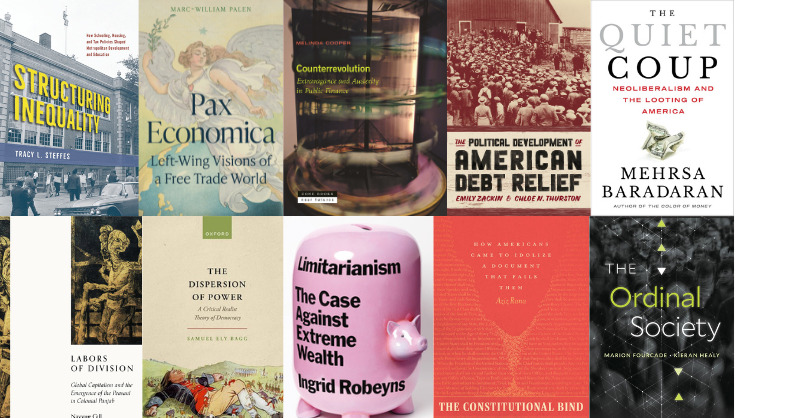Two weeks into the new year, and you’re already behind on your reading challenge? Don’t worry, the LPE Blog has your back: here are twelve books that our editors can’t wait to read in the months to come.

Labors of Division: Global Capitalism and the Emergence of the Peasant in Colonial Panjab by Navyug Gill
In 2020 and 2021, Navyug Gill offered his insights on the Blog about the farmer-laborer strikes in India, as well as what lessons other movements could draw from their victory. In his just published book, Gill looks further back in time, identifying the peasant and landless laborer as novel political subjects forged through the encounter between colonialism and struggles over culture and capital within Panjabi society. Stanford University Press / January
Limitarianism: The Case Against Extreme Wealth by Ingrid Robeyns
Exactly what it says on the tin. We will award ten LPE points to anyone who can successfully incorporate “limitarianism” into a political chant. Astra House / January
Pax Economica: Left-Wing Visions of a Free Trade World by Marc-William Palen
The historian Marc-William Palen recovers the forgotten history of the liberal radicals, socialist internationalists, feminists, and Christians who envisioned free trade as the necessary prerequisite for anti-imperialism and peace. A timely intervention in an age of growing economic nationalism. Princeton University Press / February
Counterrevolution: Extravagance and Austerity in Public Finance by Melinda Cooper
A leading theorist of neoliberalism examines the current combination of austerity and extravagance that characterizes government spending and central bank monetary policy. Focusing on Virginia school public choice theory and supply-side economics, Cooper explains how these currents produced distinct but ultimately complementary responses to the capitalist crisis of the 1970s and deepened the divide between the rich and poor. Zone Books / March
The Dispersion of Power: A Critical Realist Theory of Democracy by Samuel Bagg
In a pair of posts on the Blog, Sam Bagg has suggested that the dispersion of social and economic power is fundamental to democracy. Now that thesis receives a book-length defense, with Bagg arguing that we should see democracy as a way of protecting public power from capture and explaining what this vision entails in practice. Oxford University Press / April
Structuring Inequality: How Schooling, Housing, and Tax Policies Shaped Metropolitan Development and Education by Tracy L. Steffes
Historian Tracy L. Steffes documents how inequality in metropolitan Chicago was structured and naturalized through public policy, even as reformers tried to resist it through school desegregation, affordable housing, and property tax reform. University of Chicago Press / April
The Constitutional Bind: How Americans Came to Idolize a Document That Fails Them by Aziz Rana
In a pathbreaking retelling of the American experience, Aziz Rana shows that today’s reverential constitutional culture is a distinctively twentieth-century phenomenon. Self-recommending. University of Chicago Press / April
The Ordinal Society by Marion Fourcade and Kieran Healy
As an antidote to our recent capitulation to big data, we welcome Marion Fourcade and Kieran Healy’s forthcoming book, which argues that technologies of information management, fueled by an abundance of personal data, are transforming how we relate to ourselves and to each other through the market, the public sphere, and the state. Harvard University Press / April
The Political Development of American Debt Relief by Emily Zackin and Chloe N. Thurston
In this political history of debt relief in the United States, Emily Zackin and Chloe Thurston explain both how indebted citizens in the 19th century demanded government protection from financial burdens and why debtor politics receded in the 20th century. University of Chicago Press / May
The Quiet Coup: Neoliberalism and the Looting of America by Mehrsa Baradaran
Known for her leading scholarship on banking and racial inequality, Mehrsa Baradaran widens the aperture of her analysis in this forthcoming book, which reveals how neoliberalism and its adherents transformed American law to benefit the wealthy. The perfect gift to help your family understand why you’re always banging on about LPE. Norton / May
Overdue: The Shameful History of America’s Student Debt Crisis by Ryann Liebenthal
There has been no better public chronicler of the student debt crisis than Ryann Liebenthal, whose forthcoming book tells the maddening story of how the commodification of higher ed and the rapacious practices of for-profit colleges and private lenders have created today’s student-debt lava pit. Dey Street / September
Judicial Territory: Law, Capital, and the Expansion of American Empire by Shaina Potts
An economic, legal, and political geographer documents the overlooked role of the transnational extension of US common law and judicial authority in undermining the “developmental” or “interventionist” economic practices of postcolonial governments and in bolstering American power and the liberal international economic order since World War II. Duke University Press / September


